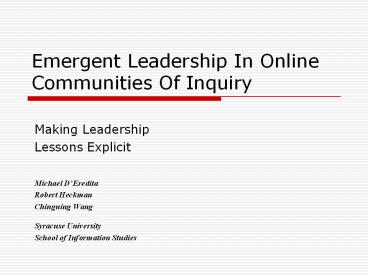Emergent Leadership In Online Communities Of Inquiry - PowerPoint PPT Presentation
1 / 24
Title:
Emergent Leadership In Online Communities Of Inquiry
Description:
When working online, students engage in many collaborative activities ... Box-and-whisker plots. Outlier: 1.5 * (IQR) 3rd Quartile ... – PowerPoint PPT presentation
Number of Views:65
Avg rating:3.0/5.0
Title: Emergent Leadership In Online Communities Of Inquiry
1
Emergent Leadership In Online Communities Of
Inquiry
- Making Leadership
- Lessons Explicit
- Michael DEredita
- Robert Heckman
- Chingning Wang
- Syracuse University
- School of Information Studies
2
Agenda
- Introduction
- Background
- Research Questions
- Method
- Results
- Implications
3
Introduction
- When working online, students engage in many
collaborative activities - Many of these activities are relatively
unstructured - Leadership is often not assigned or related to
status - In these cases leadership emerges
- Can we leverage emergent behaviors for a greater
learning effect?
4
Background Relevant literature
- Communities of inquiry
- Communities of practice
- Emergent leadership
- Constructivist perspectives on education
5
Background Online communities of inquiry
- The community of inquiry model has gained
attention in asynchronous learning network
research - Content analytic approaches have been developed
- Communities of inquiry have much in common with
communities of practice - Structure and leadership in communities of
practice has been studied
6
Background Communities of Practice (CoPs)
- Structures are emergent
- Structures are potentially predictable
- The crux of CoP practice and identity (Wenger,
1998) - Practice is both fluid and emergent
- Identity is constructed
7
Background Emergent Leadership
- A functional approach to leadership
- Theory identifies leadership behaviors on two
dimensions - Social/group maintenance
- Task
- In FTF groups
- Leaders are those who communicate most
- Social and task leaders are rarely the same person
8
Background Constructivist Education
- The Nature of Knowledge (Foote et al., 2001)
- Consists of episodic constructions (DEredita
Baretto, 2003) - The Role of the Teacher (Foote et al., 2001)
- Facilitator
- A Context for Learning (Foote et al., 2001)
- Environments that allow for autonomous, creative,
empowered learning
9
Research questions
- Are community of inquiry leadership patterns
similar to community of practice patterns? - Can emergent leadership behaviors be distributed
in a community of inquiry? - Do distributed/multiple leaders assume the
specific roles of social and task leader?
10
Method
- Four undergraduate residential classes
- Unstructured online assignment
- Descriptive statistics to identify leaders and
structure - Content analysis of asynchronous discourse
11
Method Class setting
- IST 355 Concepts and Issues in Information
Management and Technology - IST 466 Senior capstone course
- Undergraduates Juniors and Seniors
- Average class size 35
- Residential class supported by WebCT
- Discussion-based classroom setting
12
Method Assignment
- Democratic class management
- Plan the agenda for a three-week portion of the
course - Identify topics of greatest interest to class
(4th wk) - Assign students to groups to research topics (5th
wk) - Schedule research presentations (6th wk)
- Each component had a deadline
- Task to be completed within WebCT bulletin board
environment -- no in-class time
13
Method Content Analysis
- Content analytic scheme builds on
- Community of inquiry model (Rourke et al
Garrison et al Heckman and Annabi) - Emergent leadership theory
- Coding scheme identified 3 categories of
leadership behaviors - Task-Process
- Task-Product
- Social/Group-building
14
Method Descriptive Statistics
- Number of utterances as dependent variable
- No normal distribution of data
- Box-and-whisker plots
- Outlier 1.5 (IQR) 3rd Quartile
- Assume leaders to be outliers (i.e. those who
communicate most)
15
Results Assignment
- All 4 classes met the deadlines
- All 4 classes presented results as requested
- Some refinement of topics were made throughout
the entire semester - Observed some movement between bulletin board,
chat rooms, and small group discussion in class - Observed general discomfort with lack of
structure
16
Results Descriptive Statistics
17
Results Content Analysis
- Emergent leadership patterns were consistent
- Leadership was shared All groups had 2 or 3
leaders - Leaders performed both task and social leadership
behaviors (contrary to emergent leadership in FTF
groups)
18
Results Group 1 Utterances
19
Results Group 2 Utterances
20
Results Group 3 Utterances
21
Results Group 4 Utterances
22
Conclusions
- Community of inquiry leadership patterns are
similar to community of practice patterns. - Leadership behaviors can be distributed in a
community of inquiry. - Distributed/multiple leaders do not necessarily
assume the specific roles of social or task
leader.
23
Implications Future Research
- Less formal, more emergent even in an on-line
environment - Application of Weick (1995) Sensemaking
- Provide context, or problem, around which to
organize Ongoing (Direction) - Learning BOTH how to solve problem and how to
organize Identity (Reference) - Reduce the range of choice to make outcomes more
predictable Plausibility (Choice) - Allow for an opportunity to reflect and learn
from actions Retrospective (Construction of
Knowledge)
24
References
- DEredita, M., Barreto, C. (2003).
De-mystifying tacit knowledge for practical
application in the workplace. Proceedings of the
4th European Conference of Knowledge Management.
- Foote, C.J., Vermette, P.J., Battaglia, C.F.
(2001). Constructivist Strategies Meeting
Standards and Engaging Adolescent Minds.
Larchmont, NY Eye on Education. - Weick, K. (1995). Sensemaking in Organizations.
Thousand Oaks, CA Sage Publications, Inc. - Wenger, E. (1998). Communities of Practice.
Learning, Meaning and Identity Cambridge
University Press.































